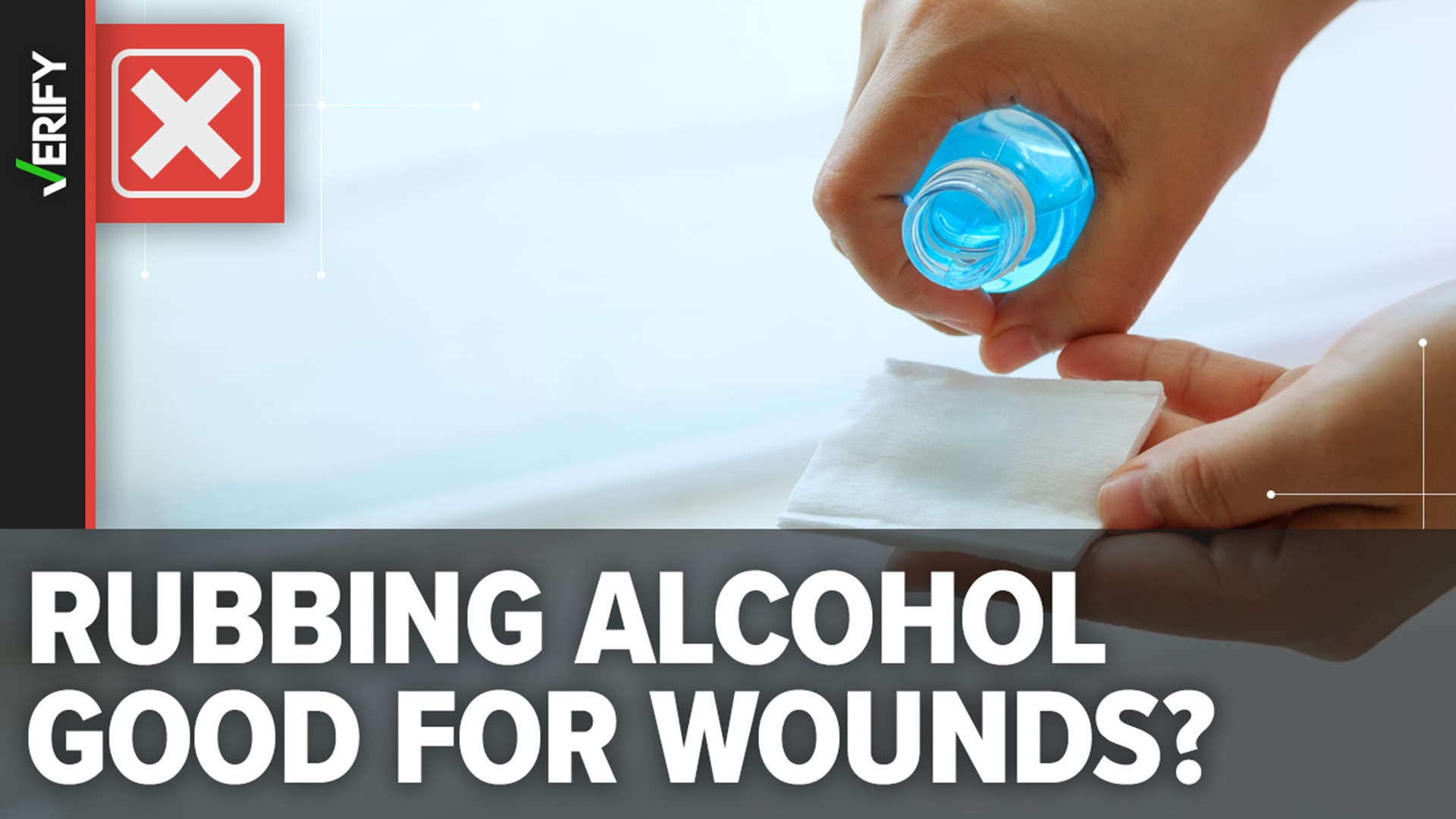If you fall and notice you are bleeding, your first step may be to grab a first aid kit and clean the wound to avoid infection. Antiseptics like hydrogen peroxide and rubbing alcohol are commonly used due to their disinfecting abilities. After a previous VERIFY story explained why you should not use hydrogen peroxide to clean wounds, a VERIFY viewer texted to ask whether the same applies to rubbing alcohol.
THE QUESTION
Should you clean wounds with rubbing alcohol?
THE SOURCES
- Cleveland Clinic
- Medline Plus, a service of the National Library of Medicine
- Mayo Clinic
- Dallas Fort Worth Wound Care Center
- Nicholas Kman, M.D., emergency medicine physician at Ohio State Wexner Medical Center
- William Schaffner, M.D., professor of Preventive Medicine at Vanderbilt University Medical Center
THE ANSWER
No, you should not clean wounds with rubbing alcohol.
WHAT WE FOUND
While rubbing alcohol does disinfect your wound, it can actually slow the healing process or cause irritation.
Rubbing alcohol, a mixture of isopropyl alcohol and water, is commonly known for being used on scrapes, cuts, or other wounds.
William Schaffner, M.D., says rubbing alcohol disinfects surfaces by “altering or destroying some of the proteins in bacteria, viruses and fungal organisms.”
Despite the disinfecting properties of rubbing alcohol, you should avoid using it to clean your wound. In an Ohio State Health blog post, Nicholas Kman, M.D., explains that rubbing alcohol “can damage surrounding healthy tissue and shouldn’t be used to clean your wounds.”
Applying rubbing alcohol to your wound can actually slow down the healing process, as the alcohol can destroy healthy cells. According to Cleveland Clinic, “new tissue is especially susceptible to harsh antiseptics because it’s more sensitive than mature skin.”
Additionally, the Dallas Fort Worth Wound Care Center explains how rubbing alcohol can cause unnecessary pain from burning. Schaffner added, “If used to excess and consistently, it can cause a certain drying of the skin and possibly irritation.”
Houston Methodist and Mayo Clinic both share tips on how to care for minor wounds, like scrapes and cuts, on their websites. Some of their tips include:
- Wash your hands. This helps avoid infection.
- Stop the bleeding. Minor cuts and scrapes usually stop bleeding on their own. If needed, apply gentle pressure with a clean bandage or cloth and elevate the wound until the bleeding stops.
- Clean the wound. Rinse the wound with water. Keeping the wound under running tap water will reduce the risk of infection. Wash around the wound with soap. But don't get soap in the wound. Remove any dirt or debris with tweezers cleaned with alcohol.
- Apply an antibiotic or petroleum jelly. Petroleum jelly or antibiotic ointments help prevent infection by covering the wound and acting as a physical barrier, but they also serve another purpose: they help keep the wound moist.
- Cover the wound. Apply a bandage or gauze held in place with paper tape. Covering the wound keeps it clean.
- Change the dressing. Do this at least once a day or whenever the bandage becomes wet or dirty.
- Watch for signs of infection. See a doctor if you notice signs of infection on the skin or near the wound, including redness, increasing pain, drainage, warmth or swelling.
For larger wounds, seek treatment from a professional. Schaffner adds, “If things start to get large, you'll want to take them to the emergency department.”
If you happen to have a bottle of rubbing alcohol lying around in your home, there are still many ways for you to put it to use safely. In a Cleveland Clinic blog post, Sarah Pickering Beers, M.D., shares some household uses. These include cleaning your bathroom tools, technology items like your phone or computer keyboard, jewelry, and your kitchen appliances.
MORE FROM VERIFY: No, you should not use hydrogen peroxide on wounds

